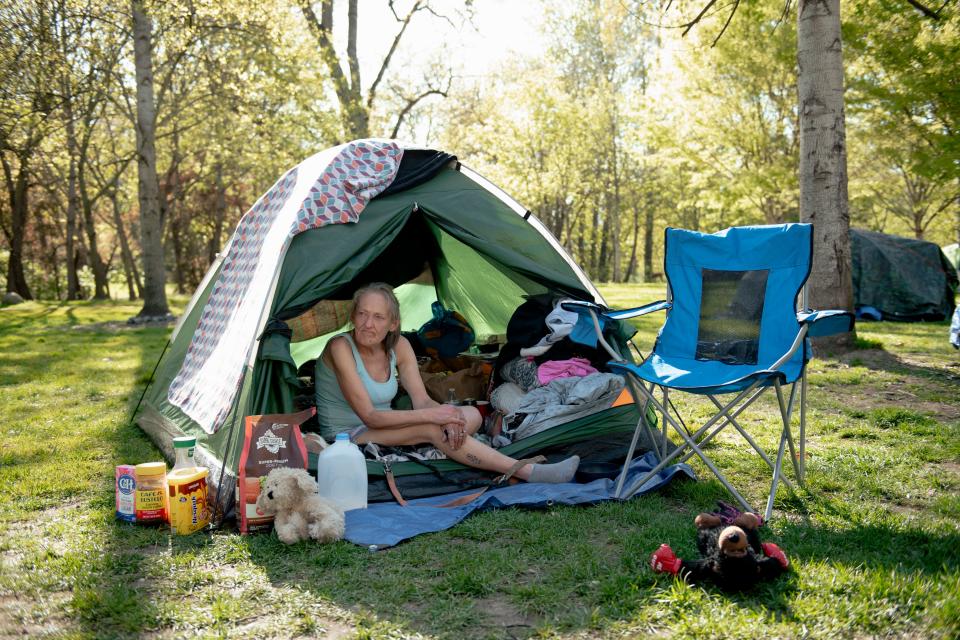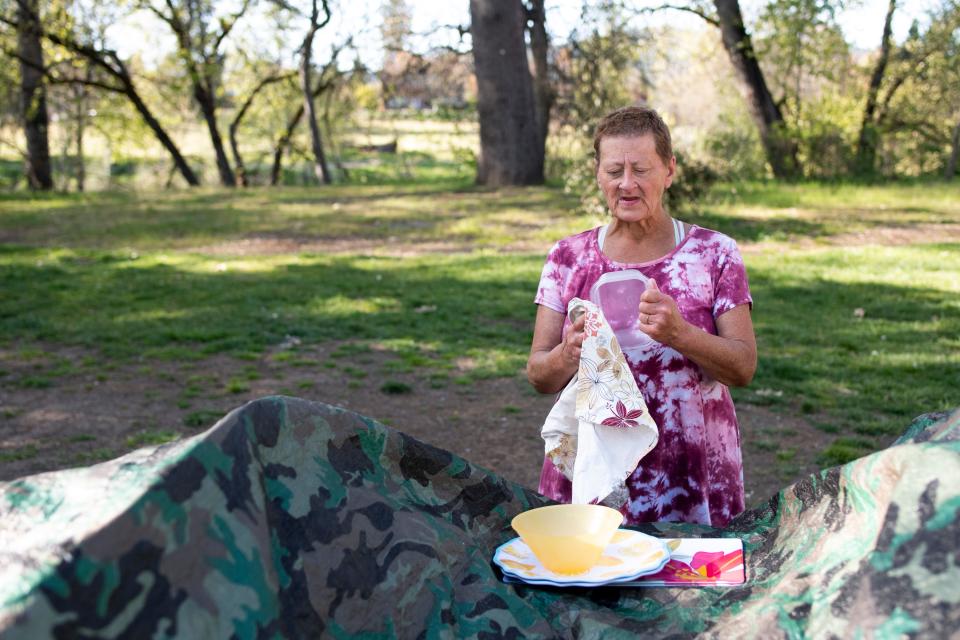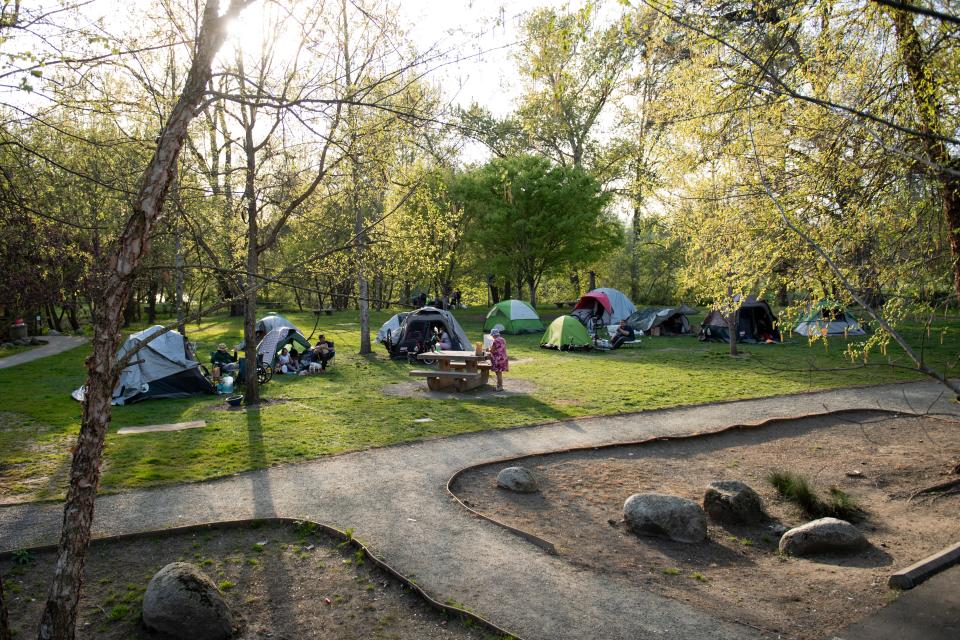Supreme Court takes up homelessness as record numbers of Americans lack permanent housing
WASHINGTON ? The Supreme Court is debating Monday how far cities can go to prevent people from sleeping in public places without effectively criminalizing homelessness, an issue of increasing importance as the number of Americans without shelter has reached record levels.
When a California-based appeals court ruled in 2018 that an anti-camping ordinance in Boise, Idaho, could not be enforced against homeless people if the city lacked sufficient shelters, the Supreme Court let that decision stand.
But when that same ruling was used to declare that similar bans in Grants Pass, Oregon, amounted to cruel and unusual punishment, the Supreme Court agreed to hear the city’s appeal.
In one of the most closely watched cases this term, Grants Pass officials say their anti-camping punishments – starting at fines of $295 and leading to jail sentences for repeat offenses ? are neither cruel nor unusual in the ordinary sense of those words. And they’re necessary to prevent homeless encampments from taking over parks and sidewalks, a persistent problem in many cities since the original 2018 decision, they argue.
“Encampments have multiplied unchecked throughout the West because generally applicable restrictions on public camping no longer play their critical deterrent role, resulting in spikes in violent crime, drug overdoses, disease, fires, and hazardous waste,” the city’s attorneys wrote in a legal brief that previewed Monday’s oral arguments.

Advocates: housing crisis won't be solved by punishment
Advocates for the homeless people challenging the restrictions say they are so expansive that it’s impossible for someone without access to shelter to live in Grants Pass without risking punishment. The city of about 38,000 in southern Oregon lacks affordable housing. It has no homeless shelter for adults. As a result, hundreds of people lack a place to sleep.
They include one of the residents who sued, Gloria Johnson, who said she has been repeatedly awakened by Grants Pass police while sleeping in her van and told she would be fined if she didn’t leave.
“America's affordable housing crisis will not be solved by throwing more people in jail,” said Jesse Rabinowitz, campaign and communications director for the National Homeless Law Center. “This is true in Grants Pass and this is true across the country.”
More: Supreme Court weighs Donald Trump case, abortion bans, homeless camps in blockbuster week
Advocates contend the real purpose of such rules is to drive people with no place to stay out of the city, making them someone else’s problem and, eventually leading to a national ban on homelessness if other cities follow suit.
Officials across political spectrum want clarity
But government officials beyond those in Grants Pass and across the political spectrum are also asking the Supreme Court to clarify what they can and can’t do.
That’s particularly true in California, home to nearly one-in-three people experiencing homelessness in the nation and nearly half who lack shelter.
California Gov. Gavin Newsom said, in a brief, lower courts have blocked efforts to clear encampments while micromanaging what qualifies as a suitable offer of shelter.
On any given night in the United States, more than 600,000 people are likely to be homeless, according to the federal government. Last year, 40% of homeless individuals slept under bridges, on sidewalks, in parks, cars, abandoned buildings and other public locations.

Court has said behavior, not status, can be criminalized
The challenge to Grants Pass’ rules is the most significant case on homelessness in decades.
But it’s related to a 1962 Supreme Court decision about a different issue, whether California could criminalize drug addiction. The Supreme Court said someone could be arrested for using illegal drugs – a behavior ? but not for being addicted to them, a status.
The California-based 9th Circuit Court of Appeals said the same argument applied in Boise and in Grants Pass. If someone is “involuntarily” homeless because no shelter beds are available, then the camping bans are going after their status, not their conduct.
Officials from Grants Pass and other cities say that’s an unworkable framework.
When is someone “involuntarily” homeless, they ask. What if someone won’t go to a shelter because it doesn’t allow pets? What if they’re kicked out of a shelter because of their behavior? And how are cities supposed to count the number of available shelter beds versus homeless people every night to determine if enough vacancies exist that someone can be ticketed for sleeping in a park?

Biden administration weighs in
The federal government has its own stake in the outcome. As the country’s largest property owner, the government shares cities’ interest in keeping public parks and other spaces in a clean, safe condition, the Justice Department told the Supreme Court. For example, after camping on the National Mall and in the park across from the White House damaged those areas, the National Park Service imposed restrictions in 1982.
The Biden administration agrees with the 9th Circuit Court of Appeals that those with no where else to go can’t be completely barred from public spaces. But the Justice Department told the Supreme Court that applying that principle needs to be based on a person’s circumstances and the appeals court didn’t say how to decide if someone is “involuntarily homeless.” Determining that there are more homeless people than available shelter beds is not enough, the Justice Department said.
A decision is expected by the end of June.
This article originally appeared on USA TODAY: Supreme Court debating if ticketing homeless is `cruel' punishment
